Renting an RV
Updated March 23, 2022 . AmFam Team
Updated March 23, 2022 . AmFam Team
When it’s time for your next vacation, you may be thinking about switching things up and renting an RV. Wondering how you can rent an RV? It’s really pretty simple and, in some ways, it works much the same as renting a car. You’ll first fill out an application, either online or at an RV dealer, and they’ll probably need a credit card for a deposit to secure your reservation.
And much like a car rental, you’ll probably need to meet the minimum age requirement to qualify. But because RVs are more complicated and much larger than a car, you may want to find an RV rental group that offers RV training to new customers before you drive off the lot. Try Googling “where to rent an RV” — you’ll likely find a long list of options and rental groups — then, reach out to those that best meet your needs.
Not only can renting an RV save you money, but it offers a whole new perspective on vacation travel. Not sure how to get started? That’s why we’re here! Check out our tips on how to rent an RV, so your first RV adventure goes off without a hitch!
If you’re looking to get into RV-ing, it’s important to understand the options available. RVs come in many different sizes and styles from large motorhomes to smaller folding trailers you can tow behind your vehicle. Here is a list of the various types of RVs and their differences to consider:
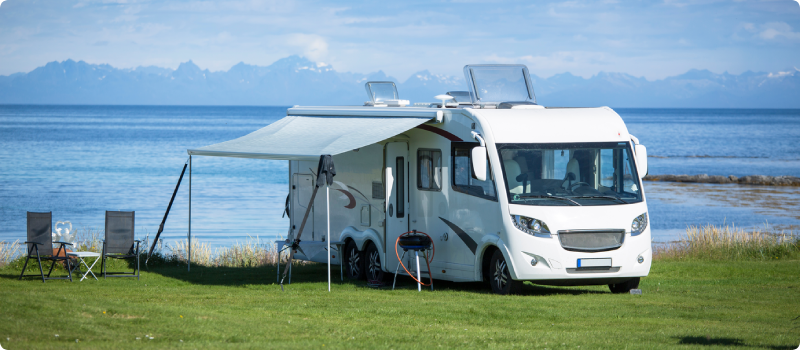
The term “RV” typically refers to two types of recreational vehicles: motorhomes and campers. Motorhomes are motorized vehicles that can have bathrooms, kitchens, beds and living spaces.
The largest models that are usually a motorcoach built on a commercial bus chassis
A camper van or a van that has built-in sleeping and eating facilities
Often called a “mini motorhome” because they resemble a compact version of class A’s with an attached cab section
Campers are trailers that can be towed or attached to the back of a vehicle. They have sleeping and eating facilities and are used for temporary quarters when camping or on vacation.
Common types of campers include:
These fold down for travel and are towed behind your vehicle
These have rigid or expandable walls and are towed behind your vehicle
These big trailers are equipped with a hitch designed to mount in the bed over the rear axle of a pickup truck
These include sleeping facilities and a special cargo-hauling compartment to transport ATVs, motorcycles and more
These fit over the bed of a pickup truck and are equipped with temporary sleeping and eating facilities
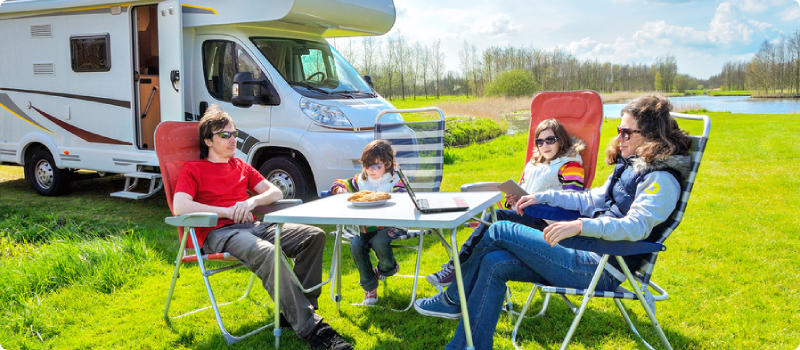
RV trekking has become very popular lately, with the industry as a whole contributing over $114 billion dollars to the US economy in 2019. If you’re new to RV-ing, renting before you buy is a great idea — you’ll get a feel for what size works best for you before your road trip. Here are a few things to consider before you rent an RV:
Don’t wait until the very last minute to rent your RV. Busy seasons like summers and especially holidays tend to book up quickly. The same goes for campgrounds. Don’t assume there will be a spot for you when you arrive. Do I need to plan out each leg of my trip?
Map out your travel route and decide on any overnight stops before you book your RV. This benefits you in a few key ways. You’ll be able to:
Online tools such as Roadtrippers, Furkot and Google Maps are great resources to leverage when mapping out your trip. Some sites allow you to input the make and model of your vehicle to estimate fuel prices for your trip.
You should know that some groups require you to pass a credit check before they allow you to rent. If your credit is less than great, you may be able to rent an RV by leaving a large cash deposit. What does it cost to rent an RV with bad credit? In most cases, it will be more expensive, but costs can vary. Check online for rental terms and conditions, or reach out to the dealer directly with questions.
Don’t forget to consider how much money you’ll need for fuel. Mileage will vary significantly depending on which RV class you select. Ask the rental group about the gas mileage your RV gets before you rent.
One quick Google query on “cheap RV rentals near me” will likely reveal dealers and RV rental groups eager for your business. But it may be wise to shop around — and don’t jump at the least expensive option right away. RVs need to be well maintained over the years, and the less costly dealers may keep their prices down by cutting corners with decreased upkeep. That can translate into breakdowns while you're out on the road.
Some RV rentals come with unlimited miles, though the daily rental rate tends to cost more for RV rentals with unlimited miles. It may be appealing to drive without closely tracking your miles, but with a little preparation and mapping out of your destinations, you can pay by the mile and save.
One-way RV rentals are possible, specifically if you book in advance from a national RV distributor. Because they have locations in many parts of the US, you may be able to rent an RV from one location and drop it off at another franchise. In some cases, you may be charged a return fee for one-way RV trips. Again, a winning strategy is to look online for “one-way RV rentals near me,” to find an RV rental group locally.
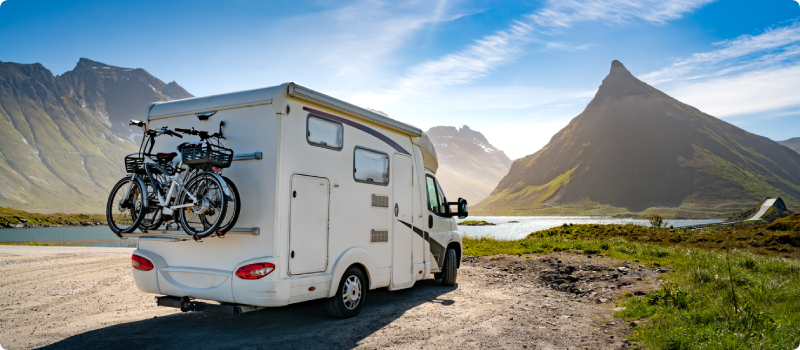
Much like homes on the market, each motorhome has its own finishes — and those all range in price. Most RVs come furnished with a bedroom or areas to sleep, a small kitchen, a living area and a restroom. Bare bones models tend to be less expensive, while the luxe, high-end models can cost a lot more.
A key part of any vacation is setting a budget. Figure out how much you can afford and then choose an RV that fits within that budget. Larger RV rental groups will have an online RV rental calculator you can use to help build out your budget.
How much it does it cost to rent an RV? The answer depends on many factors:
So, how much it is to rent an RV for a week? And how do those costs compare to a more traditional vacation involving hotels and airfare? Although the costs to rent an RV vary by type, according to Joel Clark, CEO of RVshare, you can save anywhere from 27 percent to 62 percent when compared to traditional vacation alternatives. While shopping around, be sure to inquire how much it costs to rent an RV for a month — sometimes the rates are more affordable that way.
Here's a look at average daily costs to rent an RV:
RV class | Average daily rental cost |
|---|---|
Large class A motorhome and luxury RVs | $220 - $570 |
Large class C motorhome | $150 - $360 |
Large travel trailer | $130 - $220 |
Large fifth wheel | $150 - $300 |
Class B vans | $80 - $220 |
Small travel trailers | $80 - $110 |

Getting organized is key to getting into the great outdoors. In addition to renting an RV and securing a place to park it every night, you’ll need to read up on RV maintenance.
Proper tire inflation is important for both safety and optimal fuel efficiency. Periodically check to see if you need to add a little air while out on your trek. Study up on how to prevent a tire blowout on the RV with these tips.
High-end RVs may have a tankless water heater, but most still use a water tank. Make sure it’s full before you turn on the water heater.
Get familiar with the electrical hookups before you set out. Campsite hookups have either a 30-amp or 50-amp capacity, so you may not get the same power flow at every site. Lower-amp hookups may require a little power budgeting on your part.
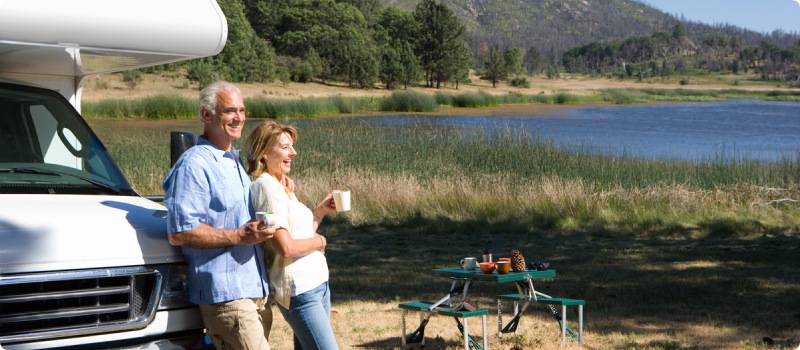
It’s important to have a firm idea of where you plan to travel before you hit the road. You’ll also need some details on the type of RV you’ll be renting, like its weight and size. But, maybe most important, is having the right drivers license to legally operate the RV.
Your RV rental company will work with you to verify that the RV drivers have proper licenses — you won't be able to rent one without. Generally speaking, you won’t need a special license to drive a smaller RV, though license restrictions do exist for the larger, heavier RVs. Check in with a state’s DMV to learn about their latest license requirements.
Class of RV | Type of license |
|---|---|
RVs over 26,000 pounds | Commercial driver’s license (CDL) – some states |
Most class B vans and vehicles/trailers with a combined weight less than 26,000 pounds | Standard driver’s license |
Be sure to head out for a practice run before you book your RV. See what it’s like to drive on the highway, side roads and in parking lots. If this is your first time with an RV, ask for a training session so the experts can teach you the basics. Or better yet, sign up for a class, get certified and then save on your insurance when you become an RV owner yourself one day.
In addition to having a valid driver’s license, there are usually some other things that RV rental groups are going to need. Here are the key things to keep in mind when you rent your RV:
Much like renting a car, a certain amount of money on your credit card will be placed on hold as a deposit. In the event that the RV is damaged, these funds will be used to make repairs.
Most RV rental companies require the RV driver to be at least 25 years old.
While most age-related terms and conditions for renting an RV are similar, some RV rental groups will allow young adults aged 21-24 to rent an RV. Younger renters may be required to pay a higher deposit amount, and the daily rates for this group can be more expensive. There may also be limits on the size of RVs available for rent to this age group.
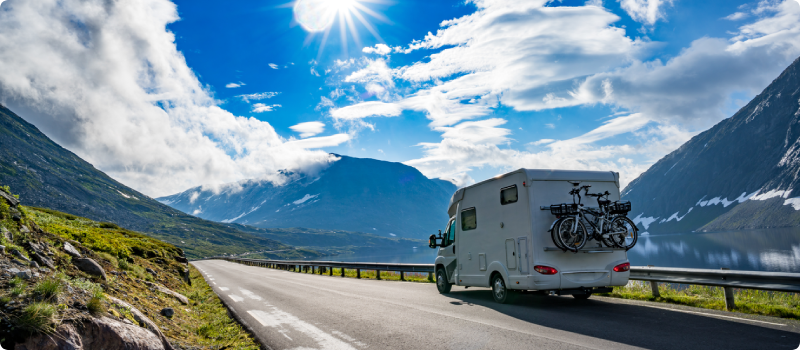
Yes, when renting an RV you should make sure you’re protected throughout your trip with insurance. You may be able to purchase insurance for the RV you’re renting directly through the RV dealer or rental business, but chances are you’re able to insure the RV through your normal home and auto insurance company instead.
Renting an RV is a wonderful way to explore the country. Following these tips will help ensure you have everything you need for a safe and fun adventure, whether you’re on the road seeing the sights or kicking back and relaxing at an evening campfire.
American Family Insurance offers rental motorhome and camper coverage to provide protection for a rental motorhome or camper unit. This provides comprehensive and collision coverage to the rented motorhome or camper and is available for up to 30 days. Connect with your local agent to learn more about this coverage and how you can protect your rental RV.
This article is for informational purposes only and based on information that is widely available. We do not make any guarantees or promise any results based on this information.
This article may include information that represents a brief description of coverages, but this is not part of your policy, and is not a promise or guarantee of coverage. If there is any conflict between this information and your policy, the provisions of the policy will prevail. Insurance policy terms and conditions may apply. Exclusions may apply to policies, endorsements, or riders. Coverage may vary by state and may be subject to change. Some products are not available in every state. Please read your policy and contact your agent for assistance.